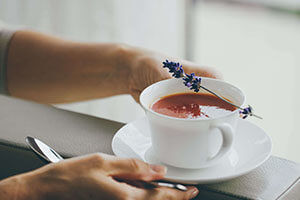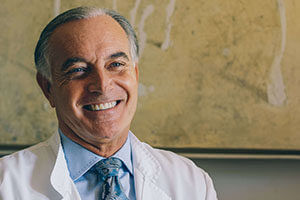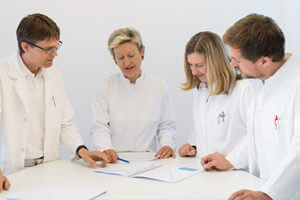As spring arrives, what better time to get into shape? That’s why now is the right time for a body reset. Fasting is the ideal way to do this. Natural remedies are an ideal accompaniment that help to support the body’s self-cleansing process.
Autophagy (from the Ancient Greek autóphagos, meaning “self-devouring”) plays an important role in the detoxification process. The phenomenon was discovered by Yoshinori Ushumi from Japan, who was awarded the 2016 Nobel Prize in Medicine for his work. It is a recycling programme within our bodies that ensures that damaged and deformed proteins and cell organelles (cell structures with certain metabolic functions) are eradicated and removed. Autophagy is also an important element of our immune defence, as it helps to sift out pathogenic germs.
Basically, this cellular “waste removal process” takes place continuously around the clock, but it really gets going during fasting. Having said that, the length of time you fast also has an impact on the intensity of self-cleansing. If, as in intermittent fasting, you only stop eating for 16 hours a day or two days a week (known as the 16:8 or 5:2 method), autophagy is less pronounced that in a five-day to three-week therapeutic fast, as offered at Buchinger Wilhelmi.
The advantage of this classic version of fasting is not only increased autophagy. If the body has to do without food for a longer period, fat burning is activated, resulting in a ketogenic state, which in turn prevents inflammatory processes and oxidative stress in the body. But these are not the only health benefits. For example, fasting stimulates the biosynthesis of the mitochondria – minute power plants in the body’s cells – and mitigates factors that promote tumour growth. It also helps the entire metabolism to convert energy more efficiently. The world’s largest study on fasting has just been published, and provides evidence of the positive effects of Buchinger fasting.
But let’s return to detoxification during fasting: As mentioned above, our body has a sophisticated physiological system that enables us to metabolise damaging and toxic substances in the liver and kidney through biotransformation and excrete them in the faeces and urine. The organism can also remove some substances via the skin and respiratory system.
The organ with the greatest metabolic performance in the body is the liver. It builds up chemical compounds that the body needs to survive (carbohydrates, fats, proteins), while at the same time decomposing (metabolising) damaging substances such as alcohol, toxic degradation products or absorbed pollutants. What’s more, it is the most important excretory organ besides the kidneys. There are various measures that can support the detoxing function of the liver.
For example, a warm liver compress is regularly applied during Buchinger therapeutic fasting. Different foodstuffs also support the excretory function of the liver, especially vegetables and salads such as chicory, radicchio, rocket, endives, Brussels sprouts and broccoli that contain a high concentration of bitter substances.
The following medicinal plants also play an important role in detoxifying the body as supplements to fasting:
Milk thistle
The special extract gained from this fruit with the active ingredient silymarin has an antioxidant and anti-inflammatory effect and also increases the regenerative capacity of the liver cells. Standardised, ready-to-use products containing 200 to 400 milligrams of silymarin concentrate as their main constituent can be used during a detox.
Artichoke leaves
Extracts and pressed juices from these leaves promote the regeneration of the liver cells. They also improve the cells’ ability to repair themselves and stimulate the excretion of bile acid.
Standardized extracts of artichoke leaves should be used that can be bought in any pharmacy. Take 10 millilitres of pressed juice two to three times daily before meals.
Dandelion
This is considered a classical example of an anti-dyscratic drug (medicinal plants with a considerable influence on the metabolism in general and on the excretory organs in particular). Both the root and the leaves can be used. With its abundance of bitter substances, dandelion supports the excretory function of the liver and boosts the formation of digestive juices and bile. It also stimulates kidney activity, helps to protect the liver and has an anti-inflammatory effect. Studies using an aqueous alcoholic root extract have also shown that this increases the regenerative capacity of the liver and inhibits fibrotic processes. Last but not least, dandelion improves the metabolism, especially the fat metabolism.
For a detox, this plant can be taken in the form of tea. Pour ¼ litre of boiling water over 1-2 teaspoons of dandelion root with leaves (ideally from a pharmacy to ensure a high quality), leave to brew for 15 minutes. Drink 2-3 cups of tea throughout the day.
Take 15 millilitres of pressed dandelion juice three times a day.
Nettles
Nettles also have an anti-dyscratic function and have been used since early times to stimulate kidney activity and the excretion of uric acid. This is very helpful after consuming lots of alcohol and fatty food, for example. Because nettle leaves also have an anti-inflammatory, immunomodulatory and antioxidant effect, they are also good for painful joints. During a detox, nettles can be taken in the form of tea, pressed juice, soup, compote or alcoholic extract.
For one cup of tea, pour boiling water over 1–2 tablespoons of fresh or dried nettle leaves and leave for 10 minutes. Drink one cup several times a day. Take 1-2 spoons of pressed nettle juice three times a day. To make soup, cook 500 g of fresh nettle leaves in ½ litre of water for around 5 minutes, then blend as desired and season with salt and pepper.
A compote with fresh nettles is a typical treatment to “purify the blood” in spring. Not only the leaves, but also the stalk (up to 3 mm ø) should be used, otherwise it will not contain a sufficient concentration of important ingredients. Eat around 50 grams of compote made with steamed leaves and stems throughout the day.
Conclusion
For all these measures to take effect, during a detox you should avoid any factors that might cause stress to the organ, such as alcohol etc. If you also make sure you exercise sufficiently in the fresh air, you can be sure to start the spring successfully with a “cleansed metabolism”.
For plenty of healthy recipes, see here:
Text: Siegfried Bäumler, printed in Food Forum, Edition 1, 2019
If you want to find out more phytotherapy, Siegfried Bäumler’s book “Heilpflanzenpraxis Heute”, Volumes 1 and 2, offers a comprehensive overview (in German only). Elsevier-Verlag, EUR 124








